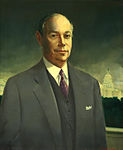Republican Party presidential primaries, 1940
|
|
|||||||||||||||||||||||||||||||||||||||||||||||
|---|---|---|---|---|---|---|---|---|---|---|---|---|---|---|---|---|---|---|---|---|---|---|---|---|---|---|---|---|---|---|---|---|---|---|---|---|---|---|---|---|---|---|---|---|---|---|---|
|
|||||||||||||||||||||||||||||||||||||||||||||||
|
|||||||||||||||||||||||||||||||||||||||||||||||

Results map by state.
|
|||||||||||||||||||||||||||||||||||||||||||||||
|
|||||||||||||||||||||||||||||||||||||||||||||||
The 1940 Republican presidential primaries were the selection process by which voters of the Republican Party chose its nominee for President of the United States in the 1940 U.S. presidential election. The nominee was selected through a series of primary elections and caucuses culminating in the 1940 Republican National Convention held from June 24 to June 28, 1940, in Philadelphia, Pennsylvania.
In the months leading up to the opening of the 1940 Republican National Convention, the three leading candidates for the GOP nomination were considered to be Senators Robert A. Taft of Ohio and Arthur Vandenberg of Michigan, and District Attorney Thomas E. Dewey of New York. Taft was the leader of the GOP's conservative, isolationist wing, and his main strength was in his native Midwest and parts of the South. Vandenberg, the senior Republican in the Senate, was the "favorite son" candidate of the Michigan delegation and was considered a possible compromise candidate. Dewey, the District Attorney for Manhattan, had risen to national fame as the "Gangbuster" prosecutor who had sent numerous infamous mafia figures to prison, most notably "Lucky" Luciano, the organized-crime boss of New York City. All three men had campaigned vigorously during the primary season, but only 300 of the 1,000 convention delegates had been pledged to a candidate by the time the convention opened. However, each of the three leading candidates had exploitable weaknesses. Taft's outspoken isolationism and opposition to any American involvement in the European war convinced many Republican leaders that he could not win a general election, particularly as France fell to the Nazis in May 1940 and Germany threatened Britain. Dewey's relative youth - he was only 38 in 1940 - and lack of any foreign-policy experience caused his candidacy to weaken as the Nazi military emerged as a fearsome threat. In 1940 Vandenburg was also an isolationist (he changed his foreign-policy stance during World War II ) and his lackadaisical, lethargic campaign never caught the voter's attention. This left an opening for a dark horse candidate to emerge.
...
Wikipedia



